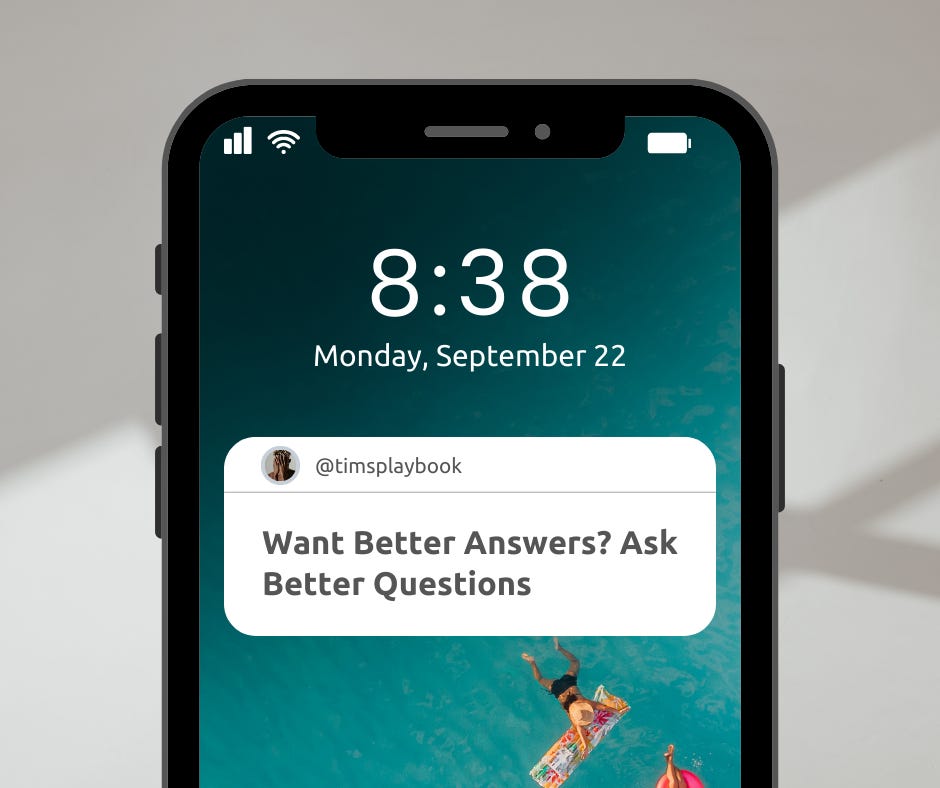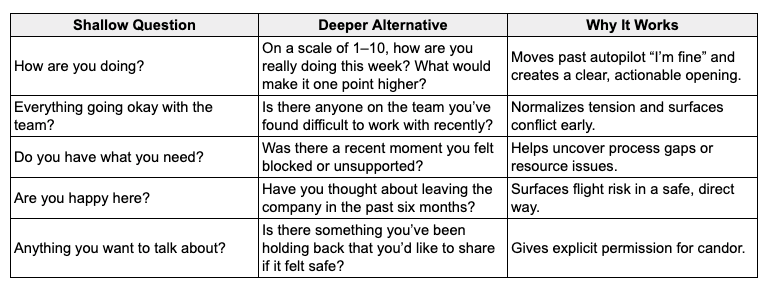Want Better Answers? Ask Better Questions
Why the questions you ask shape the trust, truth, and performance you get
I write a continuing series on leadership, management, and the future of work. Each piece addresses the real questions facing first-time managers, seasoned leaders, and executives alike. Drawing on my experience as a tech leader - and the insights of my network - I share answers that are practical, actionable, and easy to put into practice.
The Problem with “How Are You Doing?”
Every leader knows the routine. You sit down for a one-on-one, smile, and open with: “So, how are you doing?”
Nine times out of ten, the response is just as predictable: “I’m fine.”
It comes from a good place, but it is a shallow question that invites a shallow answer. And when managers default to surface-level questions, they often miss what really matters.
The truth is simple: the quality of the answers you get is shaped by the quality of the questions you ask.
Why Better Questions Build Trust
When people trust their manager, they are more likely to speak honestly, even about difficult topics like conflict, frustration, or job searches.
And the research is clear:
Trust is slipping. Edelman’s 2025 Trust Barometer found that 68% of people believe business leaders deliberately mislead them.
Engagement is sliding too. Gallup’s State of the Global Workplace 2024/25 shows global engagement has fallen back to 21%, matching the lowest levels since the pandemic. Manager engagement is even lower, at just 27%.
Managers make the difference. Gallup consistently finds managers account for 70% of the variance in team engagement. In other words: if you want trust and openness, it starts with how you lead.
Story: The Question That Changed Everything
I will never forget a meeting I had with a senior leader on my team. We went through all the usual motions: How are you doing? What are you working on? How can I help?
For an hour, we covered projects, priorities, and progress. By the end, I was ready to wrap up. Everything sounded fine. But something in their tone did not sit quite right.
As they were about to leave, I asked: “What is it that you are not telling me?”
At first, they brushed it off: “No, that’s everything.”
I pressed again: “Okay, you have told me all these things. What is the one thing you are not telling me—the thing you wish you could?”
That one question turned the meeting upside down. The next hour was a completely different conversation. This high performer, someone I thought was engaged and thriving, admitted they were struggling so much that they were considering leaving. The issues were not abstract or unsolvable. They were things I could help with. But I had almost missed them entirely.
Shallow vs. Deep Questions
I nearly missed it because I was asking the wrong questions. They were standard, repetitive, and shallow, and the answers reflected that. I wanted to dig deeper, but all I uncovered was the surface.
The striking part is how small the gap really is between an ordinary question and a great one. Yet that small shift can completely change the conversation.
So what separates questions that skim the surface from those that open the door to honesty?
Giving Permission to Be Honest
Ultimately, people rarely want to conceal anything from their manager. They want to share. They just are not always sure it is safe.
One of the simplest and most effective techniques I used with my team was a phrase: “Permission to speak freely.” I would use it when I sensed the team was giving me the runaround or telling me what they thought I wanted to hear instead of what was really going on.
It became a cue that they could be open, without judgment and without fear of fallout. The effect was subtle but powerful. People started saying what was really on their minds.
You do not need to use that exact phrase. What matters is building systems that signal safety: thoughtful questions, consistent listening, and a commitment not to punish honesty. Those small signals go a long way in creating trust.
Why It Works
When leaders ask deeper, more specific questions, they signal: “I want the real story, not the polite one.” That small shift builds psychological safety, the belief that it is safe to take risks and tell the truth. Harvard’s Amy Edmondson showed in her original 1999 study that psychological safety is what allows teams to learn faster and perform better.
What is less known is how this plays out in practice.
A study of 43 software development teams in Norway found that psychological safety enhanced team reflexivity - the ability to pause, reflect, and improve their collaborative work. Teams with that reflexivity significantly outperformed those without it.
Research on virtual teams has shown that creating explicit “permission to share” cues increases satisfaction, candour, and people’s willingness to keep working together. Asking thoughtful, specific questions works the same way. It becomes a built-in cue that honesty is expected and valued.
And in 2025’s hybrid and remote world, where casual hallway chats are rare, leaders cannot afford to rely on surface-level signals. Polite nods and standard updates do not reveal what is really happening. Deeper questions restore the visibility that distance takes away. They uncover risks earlier, build trust faster, and remind people their voice matters.
A Toolkit of Better Questions
Here are a few prompts you can use in different contexts:
One-on-ones
If you suddenly had my job for a week, what would you change first?
When was the last time you felt truly energized at work, and what made that moment different?
Is there anything I am doing (or not doing) that makes your job harder?
Performance reviews
What achievement this quarter made you feel most stretched, and what did you learn from it?
If you could redo one project from the past six months, what would you approach differently and why?
What feedback have you not received yet that you wish someone would give you?
What would you want to be able to list on your LinkedIn page as a result of your work this year?
Career conversations
What kind of work makes you lose track of time?
Looking ahead 12 to 18 months, what would make you proud to say, “I have grown here”?
Imagine you left this company in two years. What would you want to be true about your experience when you look back?
These questions do more than gather information. They open the door to real conversations about motivation, risk, and growth.
The Payoff
Better questions lead to better answers. Better answers build trust. And trust is what drives engagement, performance, and retention.
So the next time you are tempted to ask “How is it going?” pause. Reframe. Go deeper.
Better questions do not just change the conversation. They change the relationship.
🙋♂️ Coaching
Alongside writing, I coach a small number of leaders each year. Availability is limited, but if I do not have room or I am not the right fit, I will gladly recommend trusted coaches and point you in the right direction.



